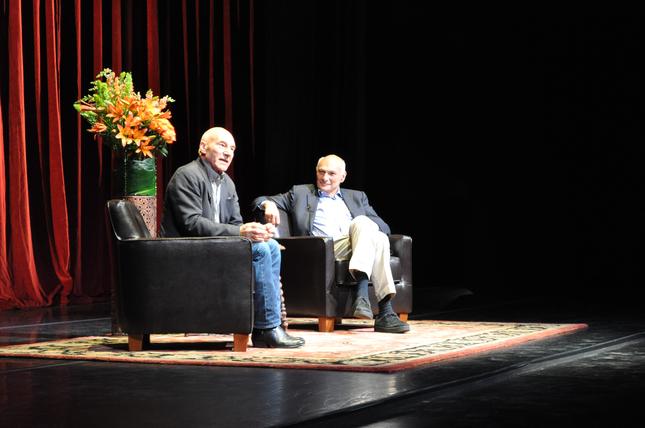Patrick Hewes Stewart and Michael Kahn Draw Crowd
By • October 27, 2011 0 1457

They roped off the street in front of the Verizon Center as thousands of Washington Capitals fans streaked into the building to see Ovie, Semin and other Russians at a hockey game. But for some people—hundreds in fact—that wasn’t the big deal on the street.
Captain Jean Luc Picard was in the house. Like, “make it so.”
That would be Patrick Hewes Stewart, Shakespearean actor of considerable renown, movie star, and knight of the realm. Sir Patrick Hewes Stewart to you.
Stewart was at Harman Hall across the street for the first installment of this year’s Classic Conversation series with Shakespeare Theatre Artistic Director Michael Kahn. To the folks here for the dialogue, which surely must have included more than a few Trekkies, this was the main event. Think about it—a full, lively, laughing, into-it crowd at Harman Hall to hear a couple of middle-aged bald guys exchanging theater stories.
“I know they have lots of people across the street,” Kahn said, “but as far as I’m concerned, this is the best bunch of people to be with.”
Stewart was one of a large number of theater and movie stars in town for a gala honoring Kahn’s 25th anniversary with the Shakespeare Theatre the previous night.
As first, as Kahn and Stewart walk on stage, you thought: they could be brothers. Both were instantly recognizable by their hairless domes, with a cut of grey and white on the side. Both were blessed with story-telling abilities. Both were now legends in the world they shared. Finally, both had been doing this long enough to have accumulated more than enough stories to dine out on.
When Kahn asked Stewart what, if any, difference his knighthood had made in his life, Stewart allowed that it was “very easy to get a table in a good restaurant in London. And the people at British Airways treat me very well.”
Stewart has straddled both a life-long theater career and the kind of iconic fame among fans of science fiction and comic books—he is also the mind-bending Charles Xavier in the X-Men movie series. He turned out to be a charming, low-key, quite modest and serious man, who’s accepted his fame—money, lots of it, knighthood and that Star Trek thing—with grace.
“There is nothing to complain about,” he said. “I mean, my goodness, its remarkable when you think about it. The Star Trek and Enterprise thing has been long done, but it’s still going on all over the world. I can go thru customs in Taiwan, and they look at me, and somebody whispers: ‘Picard’ or ‘Enterprise’ or some such thing. It’s rewarding but unnerving.”
After a difficult upbringing in a small town near Yorkshire, Stewart’s career began when an English teacher named Cecil Dormand gave him a copy of Shakespeare’s plays. “He told me to read it, so I opened the book and started reading, and he said ‘no, no, OUT LOUD, read it out loud. Perform it.”
In 1966, he made it to the Royal Shakespeare Company and performed in many plays, including Peter Brooks’ famous “A Midsummer Night’s Dream.” “I wanted to be in films, too, of course,” he said. “And when I came to Hollywood, I decided I wanted to marry Doris Day and failing that, Debbie Reynolds. I’m sure that says something.”
In the 1980s, he auditioned for Picard “wearing a toupee and speaking in a French accent.” He claims it’s in the vaults somewhere at Paramount Studios. Nevertheless, he got the job in “Star Trek: The Next Generation.” Seven years and a number of films later, he was forever famous.
“Gene Roddenbery had made it clear he didn’t want me for the part,” he said. “But there you are.”
He continued to work in theater, including a part in a Mamet play, in which “every other word was a curse word and my aunt saw it, and I swear, I could hear her in the audience, saying ‘that’s not our Patrick, he wouldn’t say things like that.'”
In somewhat muted terms, he talked about his childhood, living in a house with a quiet mother and a violent Sergeant Major father. “He never physically abused us kids, but always my mother took the brunt on weekends when he would drink.”
Today, Stewart is a patron of Refuge, a British charity for abused women.
Stewart came to the Shakespeare Theatre several years ago to play the title role in a “photo negative” version of “Othello.” “We were very proud of that production, and it was so stirring especially here in Washington,” Kahn said. All the characters except Othello were played by black actors. “It was very tense at times,” he said. “I remember Othello talking about his race, and you could hear people hiss in the audience.” And when it came time to take our bows, Ron Canada, a very fine actor who played Iago, came out and some people shouted ‘you the man, you the man.’ I hesitated but I came out and the actors said ‘YOU the man.’ And here I am, and I have to say, Michael, that, well, YOU the man.”
It went like that—talking about touring in “Waiting for Godot” with Sir Ian McKellen, starring in “Virginia Woolf”, his days in Hollywood, and performing as Shylock recently in a “Merchant of Venice,” set in Las Vegas.
Listening to Stewart and Kahn, you realized once again that all theater lives in stories (and the retelling of stories) like Stewart meeting Eva Marie Saint, whom he had admired since seeing “On The Waterfront.”
He sounded then like a star-struck young man remembering his own icons.
The Caps won, 3-0. And Stewart and Kahn swept all before them.

